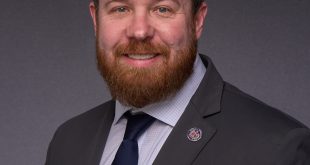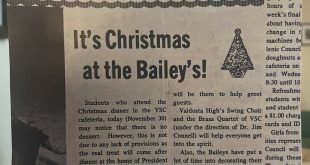Written by: LaShawn Oglesby
Twenty percent of college students will experience sexual assault on campus, according to Ms. Magazine.
This statistic isn’t new to Dr. Tracy Woodard-Meyers, director of Women’s and Gender Studies and professor of sociology, or Dr. Mark George, adjunct professor of Women’s and Gender Studies; both believe we need to educate more people about not only sexual assault but also sex in general.
“In my ideal world, students would have to take a class on sexual assault their freshman year,” Dr. Woodard-Meyers said. “It would be a class required in order to graduate.”
Dr. George said, “We live in a culture where women aren’t supposed to be sexual, so women tend to blame themselves when they are assaulted instead of the perpetrator.”
In a 2010 study involving Dr. Woodard-Meyers and Dr. George, it was estimated that 285 females are raped each year at VSU.
Most of these crimes go unreported; the campus crime report shows that two sexual assault cases were reported in 2011
“We live in a very conservative part of the country where we don’t talk about sex,” Dr. George said.
Alcohol and drugs are involved in at least half of all sexual-assault cases on campus, and freshmen are the most likely victims of this crime, with about half of sexual assaults happening to them.
“It’s scary,” Jessica Thomas, freshman mass media major, said. “I don’t really hear about stuff like that here.”
In 2000 it was reported that up to 94 percent of sexual assaults are not reported to the criminal justice system. An article in Ms. Magazine revealed that many times when a victim comes forward to the school, the accused is barely held responsible.
Dr. Woodard-Meyers and Dr. George have been part of various studies and surveys taken at VSU pertaining to sexual assault and rape issues on and off campus. In those studies they found that many male students are misinterpreting signs of consent, and female students don’t recognize all types of sexual assault, making excuses for their attackers.
“It’s an epidemic throughout the country,” Dr. Woodard-Meyers said. “So much so that the President has created a task force for it.”
Some students haven’t heard of all the different sexual-assault terms and their definitions, such as rape culture and party rapes. Many female students such as Thomas think that sexual assaults can only be violent crimes and don’t realize that just being groped or coerced into sex also falls under the category of sexual assault.
“I think they have enough of it for people to be aware,” Taymara Tait, junior mass media major, said about sexual-assault awareness at VSU. “There are so many other issues on campus; not that sexual assault is any less important, but there are a lot of issues to cover.”
The Women’s and Gender Studies program has a variety of events such as the Vagina Monologues, the Clothesline Project and the Bandana Project that students can go to and participate in to raise awareness about sexual assault crimes.
Dr. Woodard-Meyers said that in an ideal world VSU would provide all the services that The Haven provides for victims of sexual assault, from sexual-assault nurse examiners to emergency contraceptives and birth control.
| Fact Boxn The majority of rapes/sexual assaults at VSU are acquaintance rapes.
n Most sexual assaults happen to freshmen. n College women are more likely to be sexually assaulted than women not attending college. n In the 2006-2007 academic year, 12 rapes and two sexual assaults were reported at VSU. n Party rape is a distinct form of date/acquaintance rape that occurs at an off-campus house, fraternity or bar that involves supplying a woman with alcohol or targeting an intoxicated woman. |
 The Spectator The independent student newspaper of Valdosta State University
The Spectator The independent student newspaper of Valdosta State University




